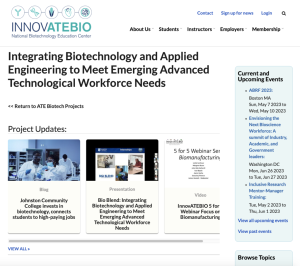Integrating Biotechnology and Applied Engineering to Meet Emerging Advanced Technological Workforce Needs

The rapidly expanding biomanufacturing industries in eastern North Carolina have a growing need for skilled technicians. For example, over the next eight years, Novo Nordisk plans to invest in a $1.8 billion production facility and to hire 800 employees, approximately 500 of whom will be maintenance and process technicians. In addition, Grifols plans to invest $375 million in production facility upgrades and plans to hire approximately 500 technicians. This project will help meet these workforce needs by blending concepts and skills of applied engineering and biotechnology into two existing Associate of Applied Science programs. To this end, four new courses will be developed in close partnership with two biomanufacturing companies. These courses will integrate applied engineering topics into the Bioprocess Technology AAS program and biotechnology topics into the Applied Engineering AAS program. In addition, both AAS programs will be enhanced by the addition of certification in the industry-standard DeltaV distributed control system software. At project conclusion, it is expected that the first cohort of approximately 15 students will have completed the biotechnology/applied engineering programs, completed internships, and be ready for work as biomanufacturing technicians. Approximately 75% of all of North Carolina's biomanufacturing is located with one hour of the central Johnston Community College campus, making the College an ideal location for this project. Thus, this project has the potential to directly contribute to the national need for a highly-trained advanced technical workforce.
The project will pursue three goals: 1) develop and implement a new curriculum that integrates biomanufacturing and applied engineering; 2) develop a multi-skilled talent pipeline from college to industry; and 3) provide hands-on education in a simulated drug manufacturing environment at the College's Workforce Development Center. With support from two local biomanufacturing companies, this facility will be enhanced with additional automated machinery and an updated design to create learning environment that simulates drug production using DeltaV industry software to control equipment, similar to that of a modern biomanufacturing facility. Students on the Applied Engineering track will learn to troubleshoot and repair production equipment in these facilities, and students on the Bioprocessing Technology track will learn to manufacture life science products by monitoring conditions such as pH, temperature, and drug concentration during production. By practicing in this environment, students will gain better skills in mechanical and biological techniques. The project coordinator will provide students with career coaching, engage in outreach to high school students, and work with industries to develop internship opportunities that will ensure employment upon program completion. By blending applied engineering and biomanufacturing, this project could provide a transferable model to better prepare students for skilled technical positions in modern biomanufacturing.
About

Comments